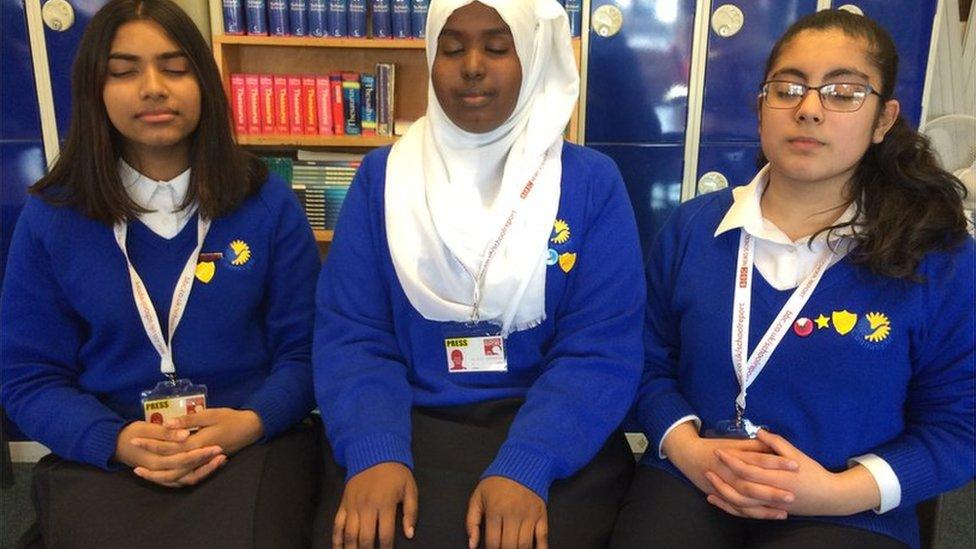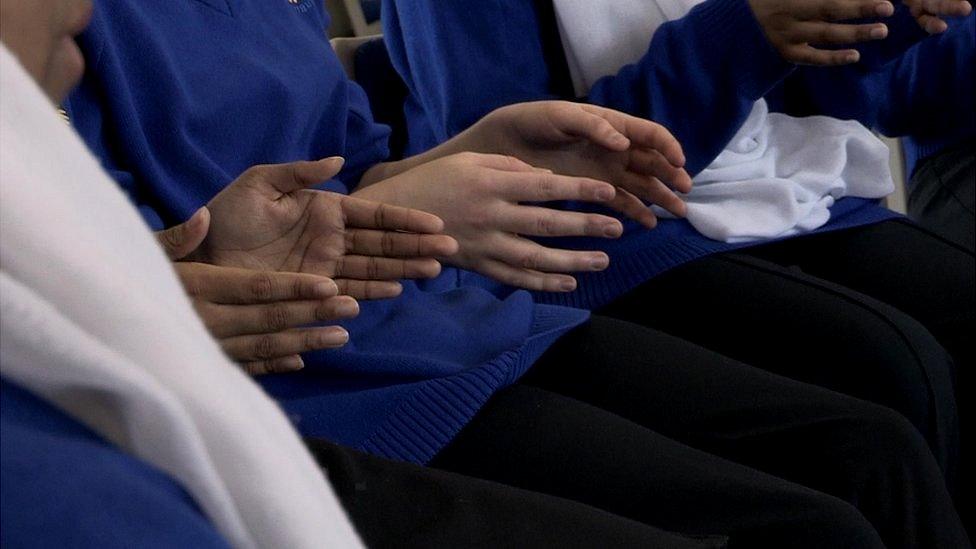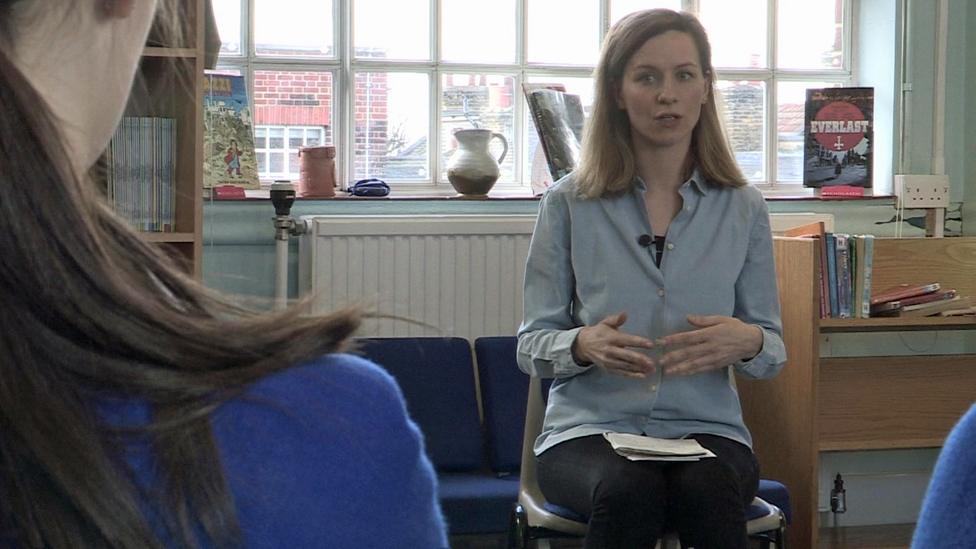Can mindfulness improve pupils' concentration?
- Published
Will meditation help students to focus?
Mindfulness is a psychological technique which is said to help combat stress. But should it be widely introduced in schools?
The practice of mindfulness - which draws on Buddhist thinking - has become increasingly popular in recent years. There have been calls for brain-training techniques, using breathing to achieve mental clarity, to be introduced in schools.
In October, the Mindfulness All-Party Parliamentary Group said the practice should be made more widely available, external and recommended the Department for Education designate three schools to "pioneer mindfulness teaching and disseminate best practice".
Political author, former head of Wellington College and vice-chancellor of Buckingham University Sir Anthony Seldon has called for daily "stillness sessions" in schools,, external saying a decline in traditional religious assemblies has left pupils with little space for reflection in the school day.
So can mindfulness meditation really help pupils concentrate amid the distractions of 21st Century living? A group of BBC School Reporters from Connaught School for Girls in Leytonstone, east London, decided to investigate for the project's 10th annual News Day.
Hannah, 14, says students wanted to establish whether mindfulness meditation could help. "We wanted to find out how it could be beneficial for our GCSEs and help us in situations where we might be very stressed."

Students practised mindfulness meditation for five minutes each lunchtime for two weeks
According to the Mindfulness in School Project, external, which has developed curriculums for use in schools, the technique can aid concentration by helping children direct their attention to the present moment - rather than becoming overwhelmed with worry about what has happened, or might happen.
"Passing these skills on to children helps them cope positively and calmly with what life throws at them," says project director Claire Kelly.
Determined to test it for themselves, the children signed up 22 volunteers. Ten practised five minutes of mindfulness meditation every day for a fortnight, while another 10 formed a control group with no meditation (the other two dropped out during the experiment).
The children found an online concentration test to use as part of the experiment, which involved memorising sequences of flashing lights. Each participant took the test at the beginning and end of the two-week experiment.

What is mindfulness?

The Oxford English Dictionary defines mindfulness as "quality or state of being conscious or aware of something"
Rooted in Buddhist philosophies, where it is described as "the meditative state of being both fully aware of the moment and of being self-conscious of and attentive to this awareness; a state of intense concentration on one's own thought processes; self-awareness"
Mindfulness has become popular in the West in recent years as a way of combating stress, anxiety and depression - the NHS lists it as one of the five steps to mental wellbeing, external
In 2015 the Wellcome Trust launched a major research programme, external in UK schools to see if mindfulness can help improve teenagers' mental health

Having completed the concentration test, the pupils invited yoga and mindfulness teacher Julie Berentsen to the school to help students in the meditation group practice a form of mindfulness.
Berentsen showed the students how to concentrate on their breath as they counted from one to 10, then one to 10 again, and so on for five minutes.
Iza and Leyla, from Connaught School for Girls, talk about a class experiment with meditation
At the end of the two week experiment, the results were positive. Those who had taken part in mindfulness meditation successfully completed the concentration task an average of 2.15 times more than before, while the results of the control group improved by just 0.69 times.
But while the girls' survey produced seemingly positive results, the use of mindfulness in schools is not without its critics.
Andre Tomlin, who assesses health research for his blog the Mental Elf, external, says there is very little evidence for the effectiveness of mindfulness in schools.

"How can we be sure that mindfulness is not causing harm to children?" asks health blogger Andre Tomlin
So what does he make of the children's conclusion that mindfulness did improve their concentration?
Tomlin says: "If this investigation is done outside of the trustworthy boundaries of a well conducted randomised controlled trial, then we cannot rely on what they find and report.
"There are all kinds of factors that could be in play for concentration to improve. It could be the placebo effect, ie children improving because they have been told they are going to be given something that will improve their concentration."

Julie Berentsen's top tips for the Connaught students

Give yourself a nice space to meditate in, so there aren't too many physical distractions
Meditate with a group of people and have that support from each other - it's hard to do it just on your own
Be kind to yourself and enjoy the experience and be really curious about what's going on with your breath and your mind.

While the students generally felt their concentration was better, the meditation did seem to make pupils tired, as noted by 14-year-old Iza, who says it made her "a bit too relaxed".
"When you meditate, you don't have any thoughts in your head and when you finish there's this burst of thought coming in and I felt really tired throughout the day."
It is the possibility of negative effects like this that are a further cause of concern for critics like Tomlin.
"It's also important to highlight the issue of safety," he says. "How can we be sure that mindfulness is not causing harm to children?
"Any intervention that is powerful enough to have a positive impact is also powerful enough to cause harm. This is an issue that is too often overlooked with psychosocial interventions, with only half of research studies measuring and reporting on adverse effects compared with 100% of drug trials."

But whatever doubts there may be, the teachers who helped the girls with their project are keen to start up a school meditation club.
The group also plans to ask their head teacher if mindfulness meditation can be incorporated into the wider school day.
Meanwhile the Department for Education, while noting the recommendations of the Mindfulness All-Party Parliamentary Group, says it has no plans to make mindfulness compulsory in schools in England, saying it trusts head teachers to implement their own policy around these issues.
To read more reports from School Reporters and to follow News Day live, visit the School Report website.
Subscribe to the BBC News Magazine's email newsletter to get articles sent to your inbox.
- Published15 July 2015

- Published6 May 2014
